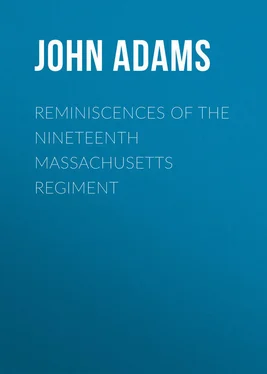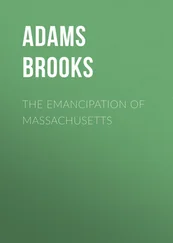John Adams - Reminiscences of the Nineteenth Massachusetts regiment
Здесь есть возможность читать онлайн «John Adams - Reminiscences of the Nineteenth Massachusetts regiment» — ознакомительный отрывок электронной книги совершенно бесплатно, а после прочтения отрывка купить полную версию. В некоторых случаях можно слушать аудио, скачать через торрент в формате fb2 и присутствует краткое содержание. Жанр: foreign_antique, foreign_prose, Историческая проза, на английском языке. Описание произведения, (предисловие) а так же отзывы посетителей доступны на портале библиотеки ЛибКат.
- Название:Reminiscences of the Nineteenth Massachusetts regiment
- Автор:
- Жанр:
- Год:неизвестен
- ISBN:нет данных
- Рейтинг книги:4 / 5. Голосов: 1
-
Избранное:Добавить в избранное
- Отзывы:
-
Ваша оценка:
- 80
- 1
- 2
- 3
- 4
- 5
Reminiscences of the Nineteenth Massachusetts regiment: краткое содержание, описание и аннотация
Предлагаем к чтению аннотацию, описание, краткое содержание или предисловие (зависит от того, что написал сам автор книги «Reminiscences of the Nineteenth Massachusetts regiment»). Если вы не нашли необходимую информацию о книге — напишите в комментариях, мы постараемся отыскать её.
Reminiscences of the Nineteenth Massachusetts regiment — читать онлайн ознакомительный отрывок
Ниже представлен текст книги, разбитый по страницам. Система сохранения места последней прочитанной страницы, позволяет с удобством читать онлайн бесплатно книгу «Reminiscences of the Nineteenth Massachusetts regiment», без необходимости каждый раз заново искать на чём Вы остановились. Поставьте закладку, и сможете в любой момент перейти на страницу, на которой закончили чтение.
Интервал:
Закладка:
Without any regimental formation we began our weary march to Malvern Hill, where we arrived at daylight, were at once ordered to support a battery, and witnessed one of the most terrible artillery battles of the war. In the afternoon our brigade was ordered to the woods and held the right of the army. The next morning, in a drenching rain, we started for Harrison’s Landing. We marched in three lines, but it was not an army, it was a mob. Artillery was stuck in the mud, wagons were abandoned and burned by the roadside. The only thought of every one was to get to Harrison’s Landing as soon as possible. Some did not stop at the landing but took boats for Washington. Among these was our minister, Levi. He had managed to keep out of every battle, and now deserted, joining the advance guard in Canada.
Harrison’s Landing when dry was a sandy plain; when we arrived it was a sea of mud. Without shelter, overcoats or blankets we dropped in the mud, and being so exhausted, having been without sleep, except the little naps caught in line of battle, for seven days, we soon forgot our misery. It was two days before we could reorganize our companies. Men were coming in who we expected were killed or captured, but July 4 upon calling the roll, we found that more than half of the men who had left Massachusetts with us less than a year before had either been killed in battle, died of disease or were sick or wounded in general hospital. The death-rate at Harrison’s Landing was fearful. Men who had stood the retreat now broke down and soon died. Every hour in the day we could hear the dead march, as comrade after comrade was laid at rest. The subject for discussion around the camp-fire was the disaster to the Union army. Newspapers called it “an important change of base.” We knew that some one had been outgeneralled, and although the men had confidence in General McClellan, we believed that while we had been digging and dying before Yorktown we should have been advancing and fighting.
Looking at the campaign in the most charitable light possible, the fact remained that on April 4 the finest army ever mustered began the advance on Richmond; that we had been within five miles of that city, and that July 4 found the army on the banks of the James River, with less than half of the number it had three months before. We were not disheartened. Many had expected that 1862 would see the end of the war, but it now looked as though those who were spared would see the end of their three years’ enlistment. The losses in officers had been such that many promotions were made. Four enlisted men were promoted second lieutenants, and I was one of the number. I was assigned to Company I, Capt. J. F. Plympton. By a misunderstanding between Colonel Hincks and Lieutenant-Colonel Devereaux, First Sergeant Driver and myself did not receive our commissions until August, although we continued as acting second lieutenants, the two commissioned by recommendation of Colonel Hincks not being assigned to duty.
It was impossible to obtain officers’ uniforms, so I bought a pair of brass shoulder-straps, sewed them on my well-worn blouse, borrowed a sword of Lieutenant Mumford and went on duty, as verdant an officer as could be found in the army of the Potomac.
About the middle of August I was ordered to report to First Lieut. John P. Reynolds for special duty. We were to take charge of the guard of the division wagon train that was ordered to Fortress Monroe. Our duty was an important one. We knew we were liable to attack at any time by guerillas, and constant vigilance was required. We often met small parties of mounted citizens who rode past our train. We believed they were “taking us in,” but we had not arrived at the time when men were arrested on suspicion, so we let them pass but kept our train well covered. We arrived at Fortress Monroe in due time, turned over the train and reported to the regiment at Newport News, they having marched a few day after we were ordered away.
While our duty as the advance guard had been arduous, we had not suffered as much as those who marched with the regiment. They had marched rapidly over dusty roads, under a broiling sun, and many had been sunstruck. Among the number was Capt. William A. Hill. He was not able to speak above a whisper for several days, and his condition was serious; but his courage was good and he remained on duty with the regiment. The men having rested a day, and being now veteran soldiers, had forgotten their hardships, and when we arrived were nearly all in the James River hunting for oysters.
On August 24, the brigade embarked on the steamship “Atlantic” for Washington, arriving at Alexandria the 28th, – just one year from the day we left Massachusetts.
CHAPTER VI
My position had changed during the past year from corporal in Company A to second lieutenant in Company I, and it took me some time to get accustomed to the new office. Up to the time I left Company A no man had been punished; but the morning that I reported for duty in Company I Captain Plympton had one man on a barrel and another on knapsack drill, and I thought I had made a mistake in not taking sparring lessons before being promoted.
I found the men of Company I as good-hearted a lot as there was in the regiment, only a little wild. The leader of the company was a young boy; he was about seventeen years old, and a private soldier, yet he was the one who settled all disputes. He was well informed in regard to the movements of the army, and had ideas respecting future campaigns that he was ready to discuss with officers or men. Soon after I joined the company he called on me and made a little speech of welcome, saying that the boys were glad I had been assigned to the company, and assured me they would make it pleasant for me. Such a reception was very gratifying. I was but twenty years of age and doubted my ability to control these men, but I commanded the company for nearly two years, and punished but one man during the time. That boy has since become known and honored by every comrade in Massachusetts. The friendship formed that day for George H. Patch continued until his death, and the memory of that light-hearted, true soldier will be precious to me while life shall last.
Leaving the transports at Alexandria, we first marched to Chain Bridge, then to Tenallytown, Md. No one seemed to know where they wanted us. We went into camp and waited for orders, which, when received, were to march at once for Centreville, to reinforce General Pope. At daybreak, August 30, we crossed the bridge at Georgetown, and reached Fairfax Court House the next morning, having marched sixty-three miles in sixty-four successive hours. It was the hardest march we had made, – twenty-four hours of the time it rained in torrents. The shoes of the men were in bad condition; many marched bare-footed, and it was impossible for them to keep in the ranks. We did not have a hundred men in the ranks when we reached the line of battle.
At Fairfax Court House we found everything in confusion. Pope’s army had been defeated at the second Bull Run and were in full retreat. Without time to make coffee we were ordered in, and deployed as skirmishers to the right of the town, as it was expected the rebel cavalry would attack the flank. We remained in this position until the army had passed, when, with the 1st Minnesota, we were selected to cover the retreat. The rebel cavalry came down on us, and we had some sharp fighting as we fell back. At Flint Hill we made a stand. Night had come on and we did not care to be bothered with the rebels any longer. The 1st Minnesota formed a V with two sections of Tompkins’s Rhode Island battery at this point, the 19th supporting the battery. On came the rebels, right into the trap we had set. The Minnesota boys opened fire, followed by the battery. The 19th charged with a yell; the rout was complete, as all not killed or wounded turned and fled. We had no time to follow them, as we were quite a distance from the main army. When we rejoined the column our two regiments were mistaken for the enemy, and fired upon by our own ranks. Assistant-Surgeon Hill was killed, Captain Russell disabled by his horse being shot, and several men wounded.
Читать дальшеИнтервал:
Закладка:
Похожие книги на «Reminiscences of the Nineteenth Massachusetts regiment»
Представляем Вашему вниманию похожие книги на «Reminiscences of the Nineteenth Massachusetts regiment» списком для выбора. Мы отобрали схожую по названию и смыслу литературу в надежде предоставить читателям больше вариантов отыскать новые, интересные, ещё непрочитанные произведения.
Обсуждение, отзывы о книге «Reminiscences of the Nineteenth Massachusetts regiment» и просто собственные мнения читателей. Оставьте ваши комментарии, напишите, что Вы думаете о произведении, его смысле или главных героях. Укажите что конкретно понравилось, а что нет, и почему Вы так считаете.












